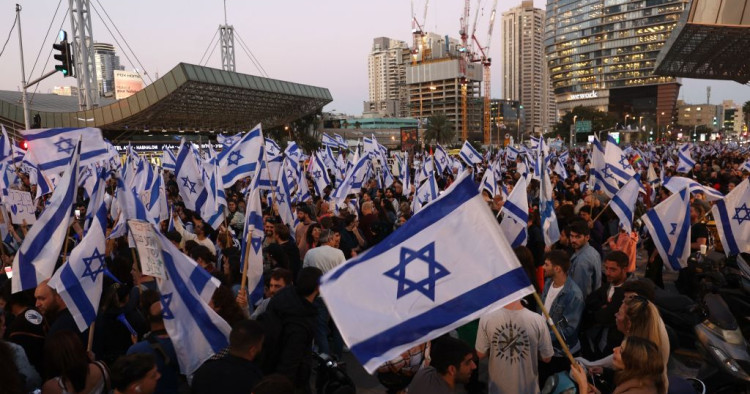Contents:
- A night like no other, as throngs of Israelis gather to safeguard democracy
- The political struggle in Pakistan is wrapped in a constitutional dilemma
- Four years on, ISIS is down but far from out
- Egypt scrambles to right its economy
A night like no other, as throngs of Israelis gather to safeguard democracy
Nimrod Goren
Senior Fellow for Israeli Affairs

-
After Netanyahu fired his minister of defense, and following a prior statement from the attorney general that the prime minister’s actions were illegal, Israelis flocked to the streets in unprecedented numbers and intensity.
-
Calls on Netanyahu to stop anti-democratic legislation are becoming widespread and echoed by President Herzog; strikes are being announced, and Israeli citizens are showcasing their power with sufficient strength and fervor that the government will find it difficult to stay the course.
It was a night like no other that Israel had seen before. After hundreds of thousands of Israelis came out to protest on Saturday — the largest such weekly opposition street rally yet — tens of thousands all over the country flocked to the streets again late on Sunday, in response to Prime Minister Benjamin Netanyahu’s decision to fire his defense minister for the latter’s comments. In Tel Aviv, protesters blocked the city’s Ayalon Highway for nine hours.
Defense Minister Yoav Gallant had attracted Netanyahu’s ire for fulfilling his duty and sharing his professional assessment of recent developments in the country: in a public speech on Saturday, Gallant spelled out what he sees as immediate national security threats stemming from the growing social rifts caused by the anti-democratic legislation Netanyahu’s cabinet is advancing. Gallant merely called on lawmakers in the Knesset to pause the legislation, to seek broad agreements, and to hold more deliberations. Yet for Netanyahu, even such measured critique was intolerable. Notably, the sacking of the defense ministry chief came less than 48 hours after Israeli Attorney General Gali Baharav-Miara accused Netanyahu of acting illegally.
Nevertheless, Israelis are showing their prime minister — week after week, in growing numbers — that they are not giving up on democracy. Protesters have been following Netanyahu in his visits abroad — in Rome, Berlin, and London — speaking out in support of democracy and disrupting his international plans. The weekly demonstrations throughout Israel, which kicked off in January, have also continued to grow in size and reach new peaks. Meanwhile, the Knesset is in the midst of its final week of work before adjourning for a planned holiday recess until the end of April. The Israeli legislature was expected to vote in the coming days on a bill that will effectively enable the government to appoint Supreme Court judges. The legislation — as well as other bills in the pipeline — would dramatically alter Israel’s system of checks and balances and shatter the foundations of its democracy.
President Isaac Herzog and other leading figures were echoing the protesters’ messaging, calling on the ruling far-right coalition to stop the problematic legislation process. Israelis are determined to remain in the streets to ensure this will happen. Protests near the Knesset persist, universities have declared they are halting academic studies, and the Hisradut, the country’s largest labor union, has announced a general strike. Growing numbers of military reservists said they will not show up for service until the threat to democracy is gone. Israeli resistance measures continue to swell and metastasize, an unprecedented demonstration of the citizenry’s power that the government is finding extremely difficult to overcome. This has led Netanyahu to change course today, on March 27, and announce a time out from the legislation process, vowing to complete it by the end of July.
Follow on Twitter: @GorenNimrod
The political struggle in Pakistan is wrapped in a constitutional dilemma
Marvin G. Weinbaum
Director, Afghanistan and Pakistan Studies

-
In response to pressure from former Prime Minister Khan, the government has cited the country’s unpreparedness for elections because of the prospect of terrorist attacks in the coming months.
-
For the first time in Pakistan’s history, it appears as though the ruling coalition government is attempting to put into practice the country’s infamous “doctrine of necessity” without formally proclaiming it or seeking Supreme Court ratification.
The faceoff between Pakistan’s federal government and the opposition Pakistan Tehreek-e-Insaf (PTI) party over the issue of holding elections continued to build as the PTI held a rally late Saturday on the grounds of the famous Minar-i-Pakistan tower in Lahore. Addressing a massive gathering of supporters, party chair and former prime minister Imran Khan, in another of his nearly year-long series of events in his quest to return to office, outlined a program to rescue Pakistan’s failing economy. Khan’s campaign has succeeded in mobilizing widespread popular support, which he is using to pressure the ruling coalition, led by Prime Minister Shehbaz Sherif, to agree to early elections. The latter, however, is determined to put off balloting both for provincial and national assembly elections as long as possible. To justify the delays, the hapless government has cited the country’s unpreparedness for elections, above all because of the prospect of terrorist attacks in the coming months against security personnel and civilians by the Tehreek-e-Taliban Pakistan (TTP) militant group. But behind this argument lies what has been for Pakistan a basic and not unfamiliar constitutional dilemma: Under what circumstances and by whose authority should perceived national security concerns take priority over presumed constitutional obligations and the rule of law?
Clashing views acquired greater intensity last Wednesday, when the Electoral Commission of Pakistan, claiming its inability to hold just and fair elections in light of security conditions and financial problems, ignored the constitution by postponing provincial elections mandated for late April to early October. This came on the heels of the military’s announcing its inability to provide security at the polls owing to its continuing engagement in counter-terrorism operations. Khan, who is meanwhile dealing with numerous government-initiated charges for criminal behavior, has tried to enlist the intervention of Pakistan’s superior courts. In a recent move, the PTI leader has asked the chief justice of the Pakistan Supreme Court through suo motu notice to find that the Election Commission and the Sherif government engaged in treason for subverting the constitution. Pushing back, the government has gone to the Supreme Court to provide legal backing for its extra-constitutional actions.
All eyes are now focused on what role Chief Justice Umar Ata Bandial will play in trying to break Pakistan’s political deadlock. Against a backdrop of deep politicization of the lawyers’ bar associations, apparently diverging sympathies among the senior justices, and questions about the judiciary’s impartiality, the chief justice has emerged as a main character in a political drama whose conclusion, many believe, will ultimately be written to suit the wishes of Pakistan Army chief Asim Munir. Even if Khan prevails at the Supreme Court, there is the real possibility that the government and security establishment may choose not to implement its decision.
For the first time in Pakistan’s history, it appears as though the ruling coalition government is attempting to put into practice the country’s infamous “doctrine of necessity” without formally proclaiming it or seeking Supreme Court ratification. To the question of who in Pakistan holds the authority to distinguish exceptional from normal times, if the past is any guide, it is the military establishment and obliging political elites that will determine when circumstances justify breaking constitutional obligations without incurring a criminal offense.
Research assistant Naad-e-Ali Sulehria contributed to this piece.
Follow on Twitter: @mgweinbaum
Four years on, ISIS is down but far from out
Charles Lister
Senior Fellow, Director of Syria and Countering Terrorism & Extremism programs

-
Over the past four years, ISIS’s covert insurgency has persisted, but so too have efforts to contain and degrade it. In Iraq, security forces are in a markedly better place to counter ISIS than they were before 2014, but it still has opportunities, particularly in the disputed regions in the north.
-
It is in Syria where ISIS holds out the most hope for a resurgence. In the northeast, 10,000 ISIS fighters are being held in 26 makeshift prisons and 55,000 women and children who came out of ISIS territory are in the al-Hol and al-Roj camps — a potential “army in detention” and ISIS’s “next generation.”
Four years ago, ISIS’s territorial “state” in Syria and Iraq was dealt its final defeat, in the village of al-Baghouz. That consequential achievement came after a four-and-a-half-year-long campaign involving a global coalition comprising over 80 countries, as well as local actors in Syria and Iraq. In Syria, the coalition’s partner force, the Syrian Democratic Forces (SDF), lost over 10,000 personnel with a further 20,000 wounded. In many respects, the intervention launched to roll back ISIS’s territorial control was unprecedented.
In the years since, ISIS’s covert insurgency has persisted, but so too have efforts to contain and degrade it. In Iraq, security forces are in a markedly better place to counter ISIS than they were in the years preceding the terrorist group’s meteoric rise in 2014 — but opportunities remain for ISIS, particularly in the disputed regions in the north. Across Iraq, 20,000 ISIS fighters remain in detention and hundreds of thousands of civilians remain displaced. Political instability continues to be a challenge, as does the role of sections of the Popular Mobilization Forces (PMFs), particularly those backed by Iran.
Yet it is in Syria where ISIS holds out the most hope for a resurgence. In the U.S.- and SDF-governed northeast, 10,000 ISIS fighters are being held in 26 makeshift prisons and 55,000 women and children who came out of ISIS territory are in the al-Hol and al-Roj camps. As far as U.S. Central Command is concerned, this mass detention represents ISIS’s “army in detention” and its “next generation.”
The challenge of achieving local prosecutions and returns (for Iraqi and Syrian nationals) and repatriation (for third-country nationals) is enormous — and completely unprecedented. At current rates, it will take 30 years to repatriate all 25,000 children currently held in camps. Even the greatest source of encouragement, Iraqi returns, will take a further six years to complete. Repatriation of third-country nationals gained rare momentum in 2022, but even then, only 1% actually went home.
For now, the presence of 900 U.S. troops in Syria’s northeast remains the glue holding together the only meaningful counter to ISIS’s insurgency there. It also provides the United States the structures and access upon which to push for, and to facilitate, local returns and foreign repatriation. Achieving real progress here is vital and requires a major international diplomatic mobilization. Without it, the ingredients for another ISIS resurgence lie waiting for the day when U.S. forces leave.
Follow on Twitter: @Charles_Lister
Egypt scrambles to right its economy
Mirette F. Mabrouk
Senior Fellow and Founding Director of the Egypt program

-
If Egypt wants the next tranche of the IMF loan, $347 million, its upcoming review will have to go well.
-
Egypt is past being able to depend on external good fortune to prop up its economy. If it doesn’t make the necessary reforms, then it will continue to hobble on, neither entirely incapacitated nor capable of rising to its feet
The government of Egypt must feel like it’s cramming for a finals exam it isn’t really prepared for.
When the International Monetary Fund (IMF) approved a $3 billion economic reform loan to Egypt under its Extended Fund Facility last December, it was to be disbursed over 46 months in nine phases, which were subject to eight reviews. The first was supposed to be held on March 15 but was delayed for unknown reasons. However, the IMF has now said that the review will be imminent; it is set for the end of March, pending a date to be agreed with the government of Egypt.
That government must be firing on all cylinders. If Egypt wants the next tranche of the loan, $347 million, that review will have to go well. The IMF loan came with several major conditions attached.
The first was that the external financing gap be shrunk down. To try to achieve that, Egypt has dusted off its privatization program, with a planned partial privatization of 32 state-owned companies. It’s hoped that the first eight will bring in a potential $2 billion, which will go toward shoring up the $17 billion deficit.
The privatization program is also directly connected to another condition: that the government open up the field and ease up restrictions on investment — a not so subtle commentary on the outsize role of the state and the military in the economy. The privatizations, both their overall size and the companies involved, will be a good indicator of whether the government is serious about the economic reforms it has said it is prepared to undertake.
The third condition of the loan was a flexible exchange rate, a condition that Egypt has undertaken, at an enormous cost to its citizens. There have been three consecutive devaluations that saw the Egyptian pound lose almost half of its value against the dollar over the past year. Despite the Central Bank of Egypt aggressively moving to tighten monetary policy (in tandem with global monetary policy) and hiking interest rates, inflation has continued to rise dizzyingly — to 25.9% in January and 32% the following month, the third highest inflation reading on record, according to the latest reports by the Central Agency for Public Mobilization and Statistics, Egypt’s state statistics agency. That inflation has made life miserable for the average Egyptian, with that misery being exacerbated by the arrival of Ramadan, traditionally a time of increased consumption. Bank forecasts have been glum, with HSBC predicting last week that the pound would fall to 37.5 against the dollar this year. Fitch’s forecast was slightly more upbeat, predicting a drop to just 33 pounds to the dollar in the first half of the year and a rebound to 30 pounds by the end of the year. As of March 26, the official rate hadn’t actually moved since March 12, at 30.96 pounds to the dollar.
There might also be a small cavalry riding to the rescue. The World Bank has just approved a $7 billion financing program, in support of Egypt’s Sustainable Development and National Climate Change strategies, along with another $2 billion from the International Finance Corporation. And on March 22 came the official announcement that Egypt had joined the development bank for the BRICS grouping of leading emerging economies — encompassing Brazil, Russia, India, China, and South Africa — as a new member just weeks after President Abdel-Fattah el-Sisi’s visit to India. Apart from the potential for trade between the BRICS countries, a meeting in August is expected to ratify that trade being conducted in national currencies, a vital boon for Egypt, which is suffering from a foreign currency shortage. However, Egypt is past being able to depend on external good fortune to prop up its economy. If it doesn’t make the necessary reforms, then it will continue to hobble on, neither entirely incapacitated nor capable of rising to its feet.
Follow on Twitter: @mmabrouk
Photo by GIL COHEN-MAGEN/AFP via Getty Images
The Middle East Institute (MEI) is an independent, non-partisan, non-for-profit, educational organization. It does not engage in advocacy and its scholars’ opinions are their own. MEI welcomes financial donations, but retains sole editorial control over its work and its publications reflect only the authors’ views. For a listing of MEI donors, please click here.













